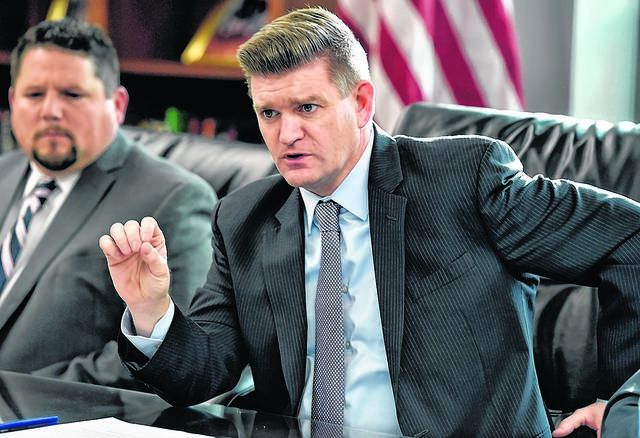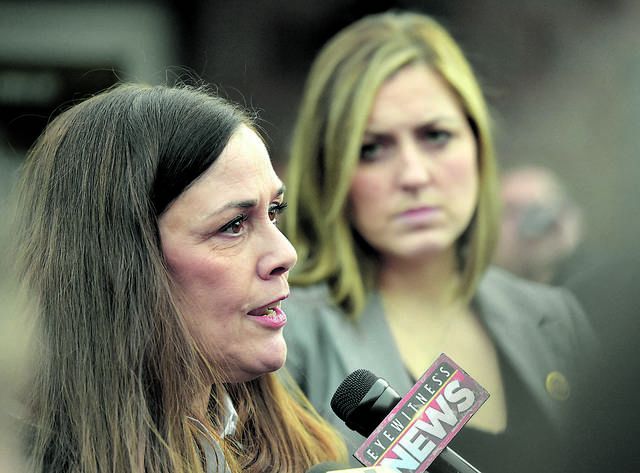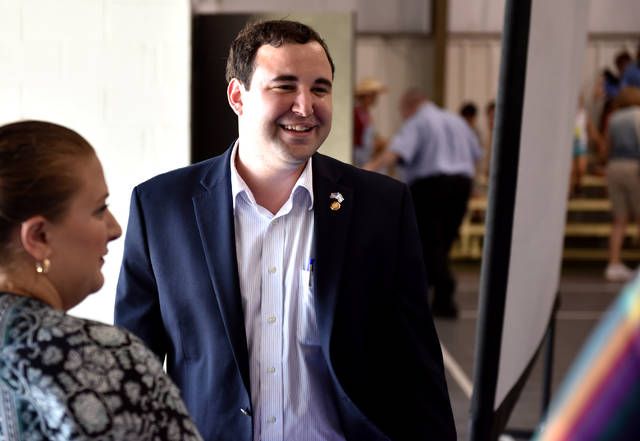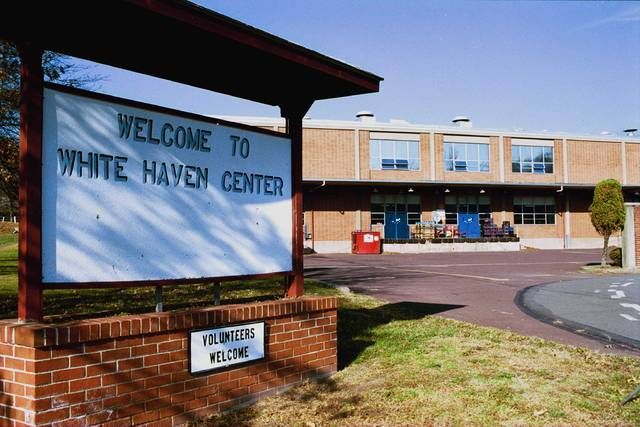Click here to subscribe today or Login.
WHITE HAVEN — When the news broke Wednesday that the White Haven Center would be closing within three years, Tom and Margaret Kashatus were upset.
Their daughter, Maria, 50, has resided at the White Haven Center since she was 12 years old. Tom Kashatus said his daughter can’t talk or walk or feed herself.
“We’re not happy,” Kashatus, 79, said. “We now have to prepare ourselves for the road ahead.”
Pennsylvania Department of Human Services Secretary Teresa Miller Wednesday announced the closure of the White Haven State Center in Luzerne County and Polk State Center in Venango County.
The decision came under fire from state Rep. Gerald Mullery and the Kashatus family of Glen Lyon, whose daughter has been a patient at the White Haven Center for 38 years.
The closure process is expected to take about three years. Both centers are intermediate care facilities for individuals with intellectual and developmental disabilities.
Kashatus said his wife is 76. He said the plan is to move his daughter and all the patients to group homes.
“Maria was in a group home when she was young before we placed her at the White Haven Center,” Kashatus said. “She fell, she got hurt and we couldn’t get any answers. That’s why we chose White Haven Center.”
Kashatus said his daughter has always received excellent care at White Haven.
“And we have the opportunity to offer our input,” he said. “And they always listen to us and they do annual reviews.”
Kashatus said he has concerns for his daughters and for all the patients at White Haven as the closure process begins.
“We’re afraid for their longevity and their quality of life,” Kashatus said. “We don’t want to see any decline.”
A news release from DHS said the closures reflect the Wolf Administration’s work to serve more people in the community, reduce reliance on institutional care, and improve access to home- and community-based services so every Pennsylvanian can live an everyday life.
Mullery, D-Newport Township, said he is opposed to the closure of the White Haven Center.
“On behalf of the residents, their families and the more than 400 care givers at the White Haven Center, I am strongly against closing the facility,” Mullery said. “This is the only home many of the residents have ever known, and while some argue community care is more cost effective, it certainly won’t be the same.”
Mullery said DHS noted the declining census and cost per resident as key factors in the closure. Mullery contends both statistics are “artificial” and “self-serving.”
“For years, the Department has fought tooth and nail against admissions into our State Centers despite tens of thousands on the waiting list for care,” Mullery said. “To turn around and cite a low census and cost-per-resident figures is disingenuous at best and fraudulent at worst.”
Mullery went on to say, “This decision, made by a lame duck governor, not only will impact the most vulnerable residents of our Commonwealth and their families, but will also dramatically affect the Greater White Haven community. Many of the small, family-owned businesses in the area rely upon the patronage of the center’s employees.”
A few years ago, Mullery said when the state Department of Corrections announced it planned to close State Correctional Institute at Retreat, SCI-Frackville and SCI-Waymart, the communities rallied and were successful in showing state officials that the need to keep the facilities open.
“It’s my hope that we will be able to redouble those efforts and maintain the services provided at White Haven Center for years to come,” he said.
Legislators comment
Sen. John Yudichak, D-Plymouth Township, said the closure of White Haven Center is a terrible blow for patients, employees, and the people of Luzerne County who care deeply about how those with intellectual disabilities are treated.
“Without warning or any advance notification, I was informed by Department of Human Services Secretary Teresa Miller this morning that over the next 36 months White Haven Center will close,” Yudichak said. “It is a decision that was made without consultation or an ounce of input from the Luzerne County legislative delegation. It is a decision that should be investigated and examined thoroughly from every perspective, especially from the perspective of the families who have entrusted the care of their loved ones to White Haven Center.”
Yudichak said his mother, Sally Yudichak, worked for many years at White Haven Center enabling him to get to know many of the employees and many of the families who loved White Haven Center.
“It is a special place, a loving home operated by a caring staff who consider themselves family,” he said. “I hope over the coming months the Department of Human Services will reconsider this abrupt and poor decision to close White Haven Center.”
Sen. Lisa Baker, R-Lehman Township, said the decision by the Wolf Administration to close the two centers will have a dramatic effect on residents and their families — taking and removing some individuals from the only home they’ve ever known, and forcing families dependent upon state centers to find new accommodations.
“This will create great angst and concern for this vulnerable population and those employees who serve them,” Baker said. “Due to their location, there will be questions about the economic consequences as well as about the assurances of equivalent care being available within the community, as most residents are classified profoundly disabled and in need of skilled care.”
Baker said local officials, workers, residents and families will need to fully participate in the public hearing and push to ensure that families have choices about where their loved ones are being served, including allowing their loved ones to remain in a state center if they choose.
Rep. Tarah Toohil, R-Butler Township, said she has been a longtime proponent of the White Haven Center, which she said has provided outstanding care to the most severely disabled individuals of our community for more than 60 years.
“I am heartbroken and disappointed by the crushing news that it will close, resulting in difficult, life-altering changes for the hundreds of men and women who live and work there,” Toohil said. “The center is much more than an institution. It is the only home many residents have ever known. They and their families now face uncertainty in making the transition to living situations in the community.
“That is why we are not going accept this decision and take every measure possible to get a reversal by the governor and Department of Human Services.”
Rep. Aaron Kaufer shared his concerns about how this closure will impact the individuals and their families who depend on the center’s care as well as the staff of the facility.
“Today, I was informed that DHS would be closing the White Haven State Center, despite the fact that they never mentioned this being considered prior to their announcement. This closure is truly a blow to our community as 112 facility residents depend on and benefit from the center’s various programs to help with their daily needs and 429 employees depend on this center to earn a living.
“DHS should not bypass input from center residents, employees or our local legislative delegation like they did before making such a critical decision. This is an issue that requires substantial legislative inquiry as a means to ensure that the state is acting in the best interests of the residents there.”
Mullery shares concerns
“On behalf of the residents, their families and the more than 400 workers at the White Haven Center, I am vehemently against closing the facility,” Mullery said. “I understand DHS will attempt to provide the affected employees with jobs at other commonwealth locations, but that’s the problem — the jobs would be at other locations. Because of family circumstances or other reasons, some people may not be able to travel a distance to get to work.
Consistent trend?
The DHS release states “consistent with national trends,” Pennsylvania has steadily closed most of its state centers since the 1960s when best practices turned toward community-based settings and away from institutions.
“Fifty years ago, in Pennsylvania, DHS served more than 13,000 people with intellectual disabilities in state-operated facilities,” the release states. “Twenty years ago, state centers served 3,000 individuals. Today, fewer than 720 individuals receive care in a state center, a decrease of more than 70 percent since 1999.”
The Polk facility currently serves 194 residents at its 2,000-acre campus; White Haven currently serves 112 at its 192-acre campus. In comparison, about 40,000 Pennsylvanians with intellectual disabilities supported by DHS live in community-based settings in Pennsylvania.
“This is an incredible moment in our history in Pennsylvania,” said Secretary Miller. “Over the past 120 years, thousands of Pennsylvanians with intellectual disabilities lived some or all their lives in Polk and White Haven state centers. We recognize their history and commend the work that center staff have done to support these individuals and their families, but we also must commit to a future that truly includes individuals with disabilities and offers them an everyday life as fully integrated members of our communities.
Miller said having an intellectual disability does not mean a person is incapable of making decisions, contributing to their community, or exploring lifelong learning opportunities.
“Community-based settings honor the inherent value of every person and empower individuals to choose the direction of their own lives,” Miller said.
DHS will work directly with each resident and family from Polk and White Haven to explore all options, meet with potential community service providers and develop individualized transition plans. After discharge from a state center, DHS social workers, and licensing and regional staff will closely monitor each person’s transition to ensure they are safe, happy and settled into their new home.
“No resident will leave Polk or White Haven without a destination of their choosing and a fully developed plan that meets their physical, emotional, social and mental health needs,” Miller said. “We will not rush this process. We are committed to working closely with residents, families, and employees to ensure a smooth, safe transition.”
DHS said researchers have concluded after many decades of study that people are healthier, and experience more opportunities and a higher quality of life in community-based settings. Currently, people are rarely admitted to intermediate care facilities as young adults because they and their families overwhelmingly choose community-based settings.
Serving people in the community also has a benefit for taxpayers. As the state centers’ censuses have declined, the annual average cost of care per resident at Polk and White Haven is now $409,794 and $434,821, respectively. Community-based care typically comes with a smaller price tag.
All regular care and operations will continue at the state centers as DHS works through the relocation and closure process. About 1,173 state employees who work at the Polk and White Haven State Centers will be supported throughout the closure process to assure they have increased opportunities for future employment. Every effort will be made to place employees who wish to continue with commonwealth employment into existing vacant positions for which they qualify. Furloughing staff is a last resort and the least desirable outcome.
Public hearings
DHS will hold public hearings within 30 days of the closure announcement to accept comment about the closure from stakeholders, officials, and the community. Hearings are scheduled for:
• White Haven State Center, Thursday, Sept. 12, 1 p.m., Hazleton One Community Center, 225 E. Fourth St, Hazleton.
A toll-free hotline has been established for family members of Polk and White Haven residents who have questions during the closure process. Family members will be able to speak with staff from 8:30 a.m. to 4 p.m. Monday through Friday by calling 1.888.565.9435 or by email at [email protected].
For more information regarding services for people with intellectual disabilities and the closure, visit www.dhs.pa.gov.








